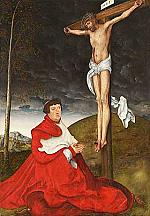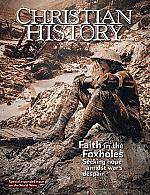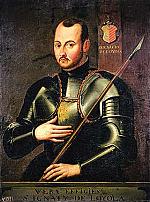From the Archives: The Schleitheim Confession
Just two years old, the Swiss Brethren movement in 1527 seemed about to be stamped out. Internally, there was confusion and no clear authority from the Zurich Brethren, two of whom were already dead. Either the "Brethren in Christ" could fall into step, or they could rally and take a separate stand. In February 1527 in the Swiss-German border town of Schleitheim a small group of Anabaptists met. This meeting and resulting document has sometimes been considered to be the real birth of Anabaptism. What resulted was not a complete confession of faith but rather the points around which there could be no disagreement. Authored largely by an ex-Benedictine prior, Michael Sattler, this document outlined a rigorous discipline that earned Anabaptists the charge of establishing a "new monkery." The consensus reflected in the "brotherly union" has withstood the test of time and guided the descendants of Anabaptism.
John Howard Yoder's translation and edition (The Legacy of Michael Sattler Herald Press, Scottdale, PA, 1973) is excerpted here.
THE ARTICLES we have dealt with, and in which we have been united, are these: baptism, ban, the breaking of bread, separation from abomination, shepherds in the congregation, the sword, the oath.
I. Notice concerning baptism. Baptism shall be given to all those who have been taught repentance and who believe truly that their sins are taken away through Christ; and to all those who desire to walk in the resurrection of Jesus Christ and be buried with Him in death, so that they might rise with Him; to all those who with such an understanding themselves desire and request it from us; hereby is excluded all infant baptism, the greatest and first abomination of the pope. For this you have the reasons and the testimony of the writings and the practice of the apostles. We wish simply yet resolutely and with assurance to hold to the same.
II. We have been united as follows concerning the ban. The ban shall be employed with all those who have given themselves over to the Lord, to walk after Him in His commandments; those who have been baptized into the one body of Christ, and let themselves be called brothers or sisters, and still somehow slip and fall into error and sin, being inadvertently overtaken. The same shall be warned twice privately and the third time be publicly admonished before the entire congregation according to the command of Christ (Mt. 18). But this shall be done according to the ordering of the Spirit of God before the breaking of bread so that we may all in one spirit and in one love, break and eat from one bread and drink from one cup.
III. Concerning the breaking of bread, we have become one and agree thus: all those who desire to break the one bread in remembrance of the broken body of Christ and all those who wish to drink of one drink in remembrance of the shed blood of Christ they must beforehand be united in the one body of Christ that is the congregation of God, whose head is Christ, and that by baptism. For as Paul indicates, we cannot be partakers at the same time of the table of the Lord and the table of devils. Nor can we at the same time partake and drink of the cup of the Lord and the cup of devils. That is: all those who have fellowship with the dead works of darkness have no part in the light. So it shall and must be, that whoever does not share the calling of the one God to one faith, to one baptism, to one spirit, to one body together with all the children of God, may not be made one loaf together with them, as must be true if one wishes truly to break bread according to the command of Christ.
IV. We have been united concerning the separation that shall take place from the evil and the wickedness which the devil has planted in the world. We have no fellowship with them, and do not run with them in the confusion of their abominations. Now there is nothing else in the world and all creation than good or eviL believing and unbelieving, darkness and light. the world and those who are come out of the world, God's temple and idols, Christ and Belial and none will have part with the other. To us, then, the commandment of the Lord is also obvious, whereby He orders us to be and to become separated from the evil one, and thus He will be our God and we shall be His sons and daughters.
Further, He admonishes us therefore to go out from Babylon and from the earthly Egypt that we may not be partakers in their torment and suffering, which the Lord will bring upon them.
From all this we should learn that everything which has not been united with our God in Christ is nothing but an abomination which we should shun. By this are meant all popish and repopish works and idolatry, gatherings, church attendance, winehouses, guarantees and commitments of unbelief. and other things of the kind, which the world regards highly, and yet which are carnal or flatly counter to the command of God, after the pattern of all the iniquity which is in the world. From all this we shall be separated and have no part with such, for they are nothing but abominations, which cause us to be hated before our Christ Jesus, who has freed us from the servitude of the flesh and fitted us for the service of God and the Spirit whom He has given us. Thereby shall also fall away from us the diabolical weapons of violence-such as sword, armor, and the like, and all of their use to protect friends or against enemies-by virtue of the word of Christ: "you shall not resist evil."
V. We have been united as follows concerning shepherds in the church of God. The shepherd in the church shall be a person according to the rule of Paul fully and completely, who has a good report of those who are outside the faith. The office of such a person shall be to read and exhort and teach, warn, admonish, or ban in the congregation, and properly to preside among the sisters and brothers in prayer, and in the breaking of bread and in all things to take care of the body of Christ. that it may be built up and developed, so that the name of God might be praised and honored through us, and the mouth of the mocker be stopped. He shall be supported, wherein he has need, by the congregation which has chosen him, so that he who serves the gospel can also live therefrom, as the Lord has ordered. But should a shepherd do something worthy of reprimand, nothing shall be done with him without the voice of two or three witnesses. If they sin they shall be publicly reprimanded, so that others might fear. But if the shepherd should be driven away or led to the Lord by the cross, at the same hour another shall be ordained to take his place, so that the little folk and the little flock of God may not be destroyed, but be preserved by warning and be consoled.
VI. We have been united as follows concerning the sword. The sword is an ordering of God outside the perfection of Christ. It punishes and kills the wicked, and guards and protects the good. In the law the sword is established over the wicked for punishment and for death, and the secular rulers are established to wield the same. But within the perfection of Christ only the ban is used for the admonition and exclusion of the one who has sinned, without the death of the flesh, simply the warning and the command to sin no more. Now many, who do not understand Christ's will for us, will ask: whether a Christian may or should use the sword against the wicked for the protection and defense of the good, or for the sake of love.
The answer is unanimously revealed: Christ teaches and commands us to learn from Him, for He is meek and lowly of heart and thus we shall find rest for our souls. Second, is asked concerning the sword: whether a Christian shall pass sentence in disputes and strife about worldly matters, such as the unbelievers have with one another. The answer: Christ did not wish to decide or pass judgment between brother and brother concerning inheritance, but refused to do so. So should we also do. Third, is asked concerning the sword: whether the Christian should be a magistrate if he is chosen thereto. This is answered thus: Christ was to be made king, but He fled and did not discern the ordinance of His Father. Thus we should also do as He did and follow after Him, and we shall not walk in darkness. For He Himself says: "Whosoever would come after me, let him deny himself and take up his cross and follow me." He Himself further forbids the violence of the sword when He says: "the princes of this world lord it over them, etc., but among you it shall not be so." Further Paul says, "Whom God has foreknown, the same he has also predestined to be conformed to the image of His Son," etc. Peter also says: "Christ has suffered and has left us an example, that you should follow after in his steps."
Lastly one can see in the following points that it does not befit a Christian to be a magistrate: the rule of the government is according to the flesh , that of the Christians according to the Spirit. Their houses and dwelling remain in this world, that of the Christians is in heaven. Their citizenship is in this world, that of the Christians is in heaven. The weapons of their battle and warfare are carnal and only against the flesh, but the weapons of Christians are spiritual, against the fornication of the devil. The worldly are armed with steel and iron, but Christians are armed with the armor of God, with truth, righteouness, peace, faith, salvation, and with the Word of God. In sum: as Christ our Head is minded, so also must be minded the members of the body of Christ through Him, so that there be no division in the body, through which it would be destroyed. Since then Christ is as is written of Him, so must His members also be the same, so that His body may remain whole and unified for its own advancement and upbuilding. For any kingdom which is divided within itself will be destroyed. VII. We have been united as follows concerning the oath. The oath is a confirmation among those who are quarreling or making promises. In the law it is commanded that it should be done only in the name of God, truthfully and not falsely. Christ, who teaches the perfection of the law, forbids His followers all swearing, whether true nor false; neither by heaven nor by earth, neither by Jerusalem nor by our head; and that for the reason which He goes on to give: "For you cannot make one hair white or black." You see, thereby all swearing is forbidden. We cannot perform what is promised in swearing, for we are not able to change the smallest part of ourselves.
Now there are some who do not believe the simple commandment of God and who say, "But God swore by Himself to Abraham, because He was God (as He promised him that He would do good to him and would be his God if he kept His commandments). Why then should I not swear if I promise something to someone? The answer: hear what Scripture says: "God, since he wished to prove overabundantly to the heirs of His promise that His will did not change, inserted an oath so that by two immutable things we might have a stronger consolation (for it is impossible that God should lie)". Notice the meaning of the passage: God has the power to do what He forbids you, for everything is possible to Him. God swore an oath to Abraham, Scripture says, in order to prove that His counsel is immutable. That means: no one can withstand and thwart his will; thus he can keep His oath. But we cannot as Christ said above, hold or perform our oath; therefore we should not swear.
Others say that swearing cannot be forbidden by God in the New Testament when it was commanded in the Old, but that it is forbidden only to swear by heaven, earth, Jerusalem, and our head. Answer: hear the Scripture. He who swears by heaven, swears by God's throne and by Him who sits thereon. Observe: swearing by heaven is forbidden, which is only God's throne; how much more is it forbidden to swear by God Himself. You blind fools, what is greater, the throne or He who sits upon it?
Others say, if it is then wrong to use God for truth, then the apostles Peter and Paul also swore. Answer: Peter and Paul only testify to that which God promised Abraham, whom we long after have received. But when one testifies, one testifi es concerning that which is present, whether it be good or evil. Thus Simeon spoke of Christ to Mary and testified: "Behold: this one is ordained for the falling and rising of many in Israel and to be a sign which will be spoken against."
Christ taught us similarly when He says: Your speech shall be yea, yea; and nay, nay; for what is more than that comes of evil. He says, your speech or your word shall be yes and no, so that no one might understand that He had permitted it. Christ is simply yea and nay, and all those who seek Him simply will understand His Word. Amen. CH
By John Howard Yoder, translator
[Christian History originally published this article in Christian History Issue #5 in 1985]
Next articles
Catholic Reformation, Did you know
We have the sixteenth century to thank for Starbucks, some famous music, and your busy calendar
the editorsEditor's note: The Catholic Reformation
Introductory remarks to the Catholic Reformation.
Jennifer Woodruff TaitHelping souls
How religious orders of the sixteenth century pursued reform and holiness
Katie M. Benjamin





